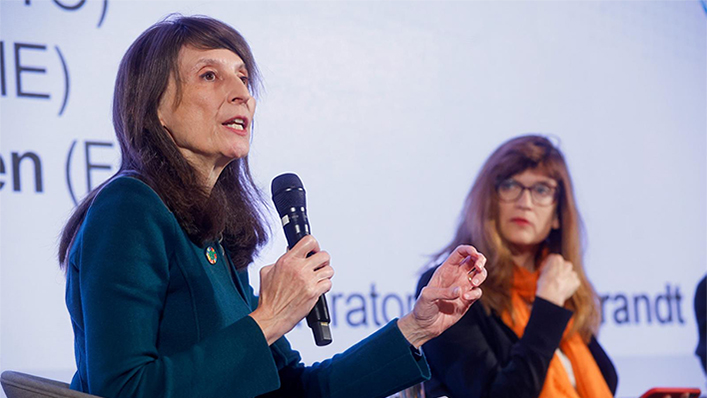
DDG Ellard said that in a world of heightened geopolitical tensions, the WTO is more important than ever as a forum where governments can work across geopolitical fault lines. She emphasized that the WTO provides a unique platform where all its members — large or small, developed or developing — have an equal voice and stake in shaping global trade rules.
“The WTO is not perfect, and our members are not perfect. But at the WTO, everyone is at the table,” DDG Ellard said, highlighting the organization’s ability to bring diverse perspectives together for consensus-based decision-making.
DDG Ellard also discussed the challenges of reaching consensus among the 166 members with their own different priorities, level of development, and political system. Nevertheless, she emphasized that consensus is achievable, particularly when it comes to global environmental and sustainability issues.
DDG Ellard highlighted the Agreement on Fisheries Subsidies, finalized in June 2022, as a prime example of how the WTO can effectively address issues related to the global commons. “Consensus is difficult, but possible, especially when issues of global importance, like ending the worst forms of unsustainable fisheries subsidies, are at stake,” she said.
DDG Ellard warned against the risks of global economic fragmentation, pointing to WTO research that shows global GDP would decline by at least 5% if the world were to decouple into two economic blocs. Developing countries would suffer even greater losses, with GDP drops in the double digits. “Re-globalization, not fragmentation, can contribute more effectively to a secure and prosperous world,” she emphasized.
DDG Ellard urged the audience of economists and scholars not to overlook the importance of the WTO and the multilateral trading system in the current global environment.
“Because the WTO is so vital, it is in everyone’s interest to reform and improve it,” she underlined. “And don’t take it for granted. A robust WTO is an essential element to bring countries together and ensure a more stable and resilient global economy.”
The 3rd Kiel-CEPR Conference on Geoeconomics, organized by the Kiel Institute for the World Economy and the Centre for Economic Policy Research, serves as a prominent platform for discussing the intersection of economic and geopolitical issues.
Share
Reach us to explore global export and import deals